What's Happening?
The Trump administration has suspended funding for the U.S. President’s Emergency Plan for AIDS Relief (PEPFAR), a program credited with saving over 26 million lives globally. This decision has led to significant disruptions in HIV/AIDS responses in numerous countries, including Uganda, the Philippines, and Tanzania. The funding cuts have resulted in medicine shortages, staffing reductions at clinics, and halted community outreach services. These disruptions are creating conditions for drug-resistant HIV strains to emerge, as patients are forced to ration their antiretroviral medications. Despite a waiver issued by the U.S. State Department to exempt life-saving services from the freeze, many projects have been terminated, severely affecting healthcare systems in over 50 countries.
Why It's Important?
The suspension of PEPFAR funding poses a significant threat to global health, particularly in regions heavily reliant on U.S. aid for HIV/AIDS treatment and prevention. The emergence of drug-resistant HIV strains could reverse decades of progress in combating the disease, leading to increased mortality rates and healthcare costs. The cuts also highlight the broader implications of U.S. foreign aid policies on international health initiatives. Stakeholders, including international organizations and healthcare providers, are concerned about the long-term impact on vulnerable populations and the potential for increased global health instability.
What's Next?
The future of PEPFAR remains uncertain as Congress and the White House continue to debate budget allocations. The State Department has announced plans to distribute a new HIV prevention drug, lenacapavir, in high-burden countries by 2026. However, the lack of clarity on current funding and program activities complicates efforts to assess and address the ongoing impact of the cuts. International and domestic stakeholders are likely to increase pressure on the U.S. government to restore funding and ensure the continuity of critical health services.










